How does Forex Mean Reversion work?

Nothing is permanent in this world, right? This is especially true in the case of forex prices which is what allows traders to speculate in the hopes of making profitable trades. There’s a school of thought in the forex world that believes that highs and lows of currency prices are only temporary, and prices will reach their mean or average levels sooner or later. Following up on this theory is the concept of identifying a trading range for a currency, computing its average price by using various analytical techniques and then using this range in placing future trades.
Many traders use the concept of Forex Mean Reversion, which is based on a simple assumption that while the price of a currency will fluctuate between highs and lows, it is bound to return to its mean or true value. The basic strategy involves finding the appropriate average range of the currency, while also identifying the circumstances when it deviates significantly from that range. This is followed by using the identified opportunities to buy or sell the currency and waiting for it to return to its mean levels.
Using the Forex Mean Reversion Strategy
But it is not as simple as it sounds and if it was, everyone would be using it and making profits on their forex trades. One needs to know that there are several instances when the price does not pull back or move up to its mean range, resulting in massive losses for novice players.
Avoiding these situations requires strict entry management rules, a specific risk management approach and an emotionally stable character to avoid over trading. The Forex Mean Reversion strategy requires expertise and knowledge to make profit. This is where you require some expert guidance or help too.
Challenges in Using Mean Reversion Strategy
As they say, “All that glitters is not gold.” The Forex Mean Reversion strategy may not work when the markets are trending in a particular direction. For instance, if the forex market is witnessing a strong upward or downward movement, which is part of a bigger economic trend, there is a high chance that prices will continue to move up or down, even if they are far from their mean values. Again, the exchange rate for a currency can diverge from its historical mean for a long period due to political and economic factors, such as political unrest, trade imbalance, poor economic policy, etc.
Apart from this, several other challenges may make it difficult for investors to use this strategy to their advantage:
- The first challenge is deciding which mean average technique to use, the 50 day smooth moving average or the 100 day smooth moving average? Knowing the pros and cons of using either of these averages and the trading opportunities thrown up by them is important.
- In certain situations, the reversal of a trend may take place at a slow place, while the moving average price or the mean price may move nearer to the actual price. This in turn leads to a narrowing of the reward ratio of the trade.
- The trends need to be read accurately to know whether they are actually going to reverse or continue in the same direction, if you wish to avoid losses.
- Technical indicators may be required to understand a trend more clearly and identify its turning point.
- Being vigilant and not opening a trade on emotional grounds is, as always, important to avoid large losses.
So, forex prices may reach their mean levels at some point or other, but the key is to understand the trend correctly and identify hints of its reversal. Not being swayed by emotions, such as fear or greed, is also very important if you wish to make the right decisions in forex trading.
Disclaimer
If you liked this educational article, please consult our Risk Disclosure Notice before starting to trade. Trading leveraged products involves a high level of risk. You may lose more than your invested capital.




